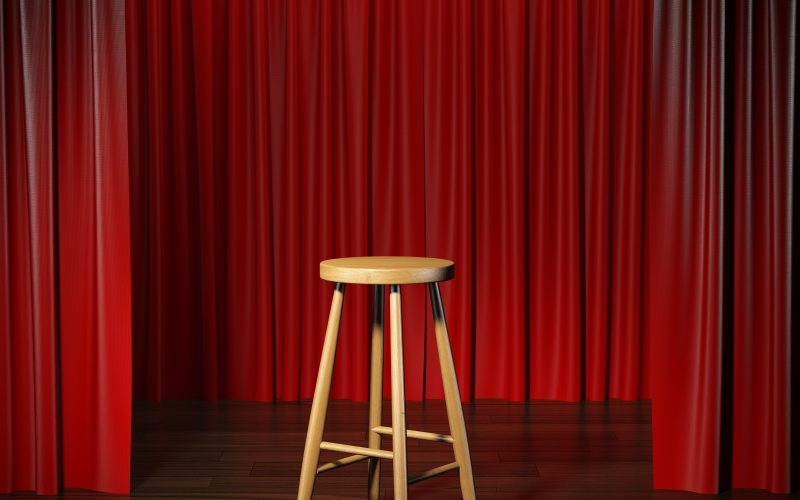
Courtesy Photo
Whitney Wasson, a Fayetteville Comedienne, said that instead of dreading political correctness in comedy, comedians should strive to be more clever with their jokes.
We see it all over our social media newsfeeds every day. Someone notable says something opinionated or possibly offensive and it trends, starts a news cycle and rustles everyone’s feathers for a little while. Then we move on to the next.
Headlines such as “How Social Justice Warriors Are Creating An Entire Generation Of Fascists,” “Sexism in Comedy: The Most Sexist Male Comedians,” and “Are Liberals Becoming Too Sensitive and Politically Correct?” make it clear there is a polarization happening from all sides about sensitivity. Whether it’s real commentary or a snark, recalcitrant remark, people are getting hot and bothered out there.
Taking it all in has really got me thinking. Is our culture actually becoming hyper-sensitive? Are we in a culture where people are looking to be offended?
Some would say yes, definitely. I’m not so sure.
Comedy or humor is often the vehicle accused of disguising offensive beliefs, and lately, a lot of it has been under scrutiny for sensitivity. In an age where what you say can be archived and drudged up later to hurt your image and career, comedians can be put on the chopping block at breakneck speed. It seems comedians are fed up with it.
Recently, Jerry Seinfeld said he’s fed up with the politically correct culture of colleges, and announced he’s done with them altogether. Patton Oswalt has quit social media because he’s sick of defending his jokes.
Oswalt also took to Twitter to defend Trevor Noah — the next Daily Show host — against the critics who say some of Noah’s 9,000 tweets contain anti-Semitic and sexist content. In Oswalt’s 53 tweet response, he mocked the entire “social justice warrior” dialogue about those who are eager to point out trigger warnings in jokes, patriarchal privilege or other insensitivity. His point appeared to be that everyone now has something to say about every little joke, and people need to chill out.
“Humor is where you’re surprised,” said Ben Pollock, longtime area journalist who served as the 2014-15 interim assistant director of the University of Arkansas Center for Ethics in Journalism. “Not that you’re shocked or offended, just that you’re simply surprised. The unexpected. The more clever you are, the less need you have to be offensive.”
I’ve decided there are things that deserve the criticism, if only to help social progress. Take the example of Michael Richards, a.k.a Seinfeld’s Kramer, who went on a racist tirade where he called a heckler the “n-word.” Shortly after it went viral, his reputation was finished and he’s been blacklisted as a performer. He’s since realized that was not cool.

Courtesy Photo
Jonathan Shannon, a Fayetteville comedian, said he ultimately thinks it’s good that there’s more scrutiny on comedy within reason.
Insert obligatory question: Is there a line that shouldn’t be crossed in comedy? I’ll say what all the people I interviewed for this piece said: yes and no.
Sometimes jokes — or better yet, poorly executed jokes — can get a little outright and clearly offensive at the expense of a person or group who are marginalized or vulnerable, normally just for shock value. This is called punching down, i.e. a joke’s punchline, and is never recommended. It’s good practice to always punch up; to make jokes at ideas and people of power or privilege. In this ideal rule, comedy acts as an equalizer. According to a couple Fayetteville comedians, there’s more to it than that, though.
“It’s been my thesis that you can joke about anything provided you’re funny,” said Whitney Wasson, a Fayetteville comedienne who does a lot of jokes about queer comedy. “It doesn’t matter if you’re Louie C.K. or Seinfeld, if you say something and it doesn’t land and it isn’t funny, you know immediately. But, what works well for an audience might not work well for another, so it’s hard to say if something is universally funny and this isn’t.”
Kaia Hodo, a Fayetteville transgender comedienne, said criticism is important to comedy in order to move it forward.
“If you have a room of 10 people who think a joke is awful there’s one person who would think to themselves I bet I could do that better,” she said. “A lot of it isn’t about taking people down. It’s about moving forward.”
Jonathan Shannon, another Fayetteville comedian, said he’d be mortified if he found out he deeply offended an audience member. Ultimately, the recent trend toward sensitivity and scrutiny is more positive than negative, he said.
“People are becoming at least more aware that they could hurt other people’s feelings,” he said. “I feel it’s changed for the better because people are saying now that maybe you should slow down on the sexism, and it’s helped their comedy out. At the same time, I see some people get a little too excited to call out comedians and call them worthless human beings. They’re still people.”










